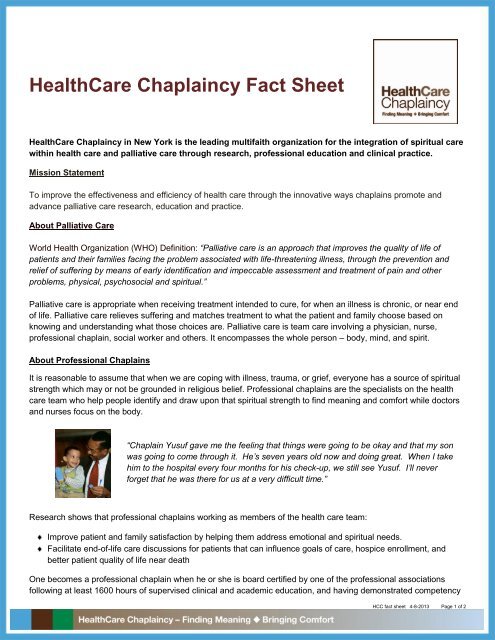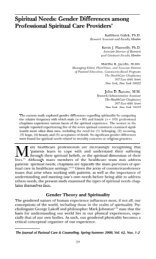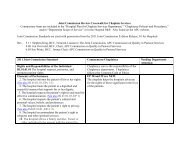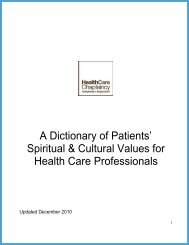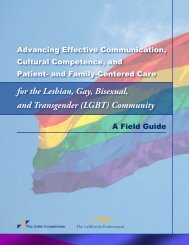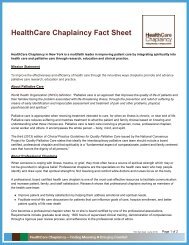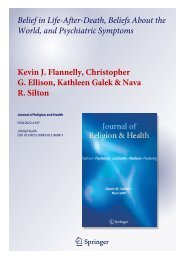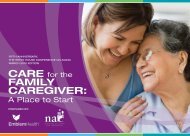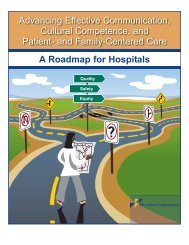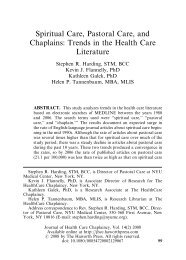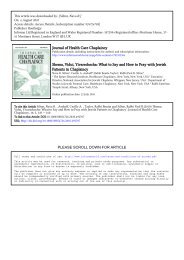HealthCare Chaplaincy Fact Sheet
HealthCare Chaplaincy Fact Sheet
HealthCare Chaplaincy Fact Sheet
You also want an ePaper? Increase the reach of your titles
YUMPU automatically turns print PDFs into web optimized ePapers that Google loves.
<strong>HealthCare</strong> <strong>Chaplaincy</strong> <strong>Fact</strong> <strong>Sheet</strong><br />
<strong>HealthCare</strong> <strong>Chaplaincy</strong> in New York is the leading multifaith organization for the integration of spiritual care<br />
within health care and palliative care through research, professional education and clinical practice.<br />
Mission Statement<br />
To improve the effectiveness and efficiency of health care through the innovative ways chaplains promote and<br />
advance palliative care research, education and practice.<br />
About Palliative Care<br />
World Health Organization (WHO) Definition: “Palliative care is an approach that improves the quality of life of<br />
patients and their families facing the problem associated with life-threatening illness, through the prevention and<br />
relief of suffering by means of early identification and impeccable assessment and treatment of pain and other<br />
problems, physical, psychosocial and spiritual.”<br />
Palliative care is appropriate when receiving treatment intended to cure, for when an illness is chronic, or near end<br />
of life. Palliative care relieves suffering and matches treatment to what the patient and family choose based on<br />
knowing and understanding what those choices are. Palliative care is team care involving a physician, nurse,<br />
professional chaplain, social worker and others. It encompasses the whole person – body, mind, and spirit.<br />
About Professional Chaplains<br />
It is reasonable to assume that when we are coping with illness, trauma, or grief, everyone has a source of spiritual<br />
strength which may or not be grounded in religious belief. Professional chaplains are the specialists on the health<br />
care team who help people identify and draw upon that spiritual strength to find meaning and comfort while doctors<br />
and nurses focus on the body.<br />
“Chaplain Yusuf gave me the feeling that things were going to be okay and that my son<br />
was going to come through it. He’s seven years old now and doing great. When I take<br />
him to the hospital every four months for his check-up, we still see Yusuf. I’ll never<br />
forget that he was there for us at a very difficult time.”<br />
Research shows that professional chaplains working as members of the health care team:<br />
Improve patient and family satisfaction by helping them address emotional and spiritual needs.<br />
Facilitate end-of-life care discussions for patients that can influence goals of care, hospice enrollment, and<br />
better patient quality of life near death<br />
One becomes a professional chaplain when he or she is board certified by one of the professional associations<br />
following at least 1600 hours of supervised clinical and academic education, and having demonstrated competency<br />
HCC fact sheet 4-8-2013 Page 1 of 2
and adherence to the professional code of ethics. A professional chaplain:<br />
Serves all people regardless of religion or beliefs – not solely those of the chaplain's own faith.<br />
Does not proselytize or promote the chaplain's own faith tradition.<br />
Is an objective mediator who helps defuse conflicts and crises through facilitating communication and cultural<br />
sensitivity<br />
Gains new skills through continuing professional education.<br />
Research<br />
In 2011 the John Templeton Foundation selected <strong>HealthCare</strong> <strong>Chaplaincy</strong> (HCC) to manage a three-year $3 million<br />
grant to identify and explore hypotheses about chaplains’ contributions to palliative care and build a community of<br />
researchers, including professional chaplains, to grow the field of research on spiritual care in palliative care.<br />
HCC staff has published close to 100 research articles on different aspects of spirituality and health in peerreviewed<br />
scientific journals in medicine, nursing, psychiatry, psychology, sociology, and chaplaincy/pastoral care.<br />
Professional Education<br />
HCC and The California State University Institute for Palliative Care – two leaders in their fields – have joined<br />
forces to create a new online certificate course to train chaplains and other spiritual care providers in effective<br />
delivery of palliative care to patients and their families in hospitals, hospices, long-term care facilities, and<br />
elsewhere. In addition, HCC is one of the largest providers of clinical pastoral education.<br />
HCC publishes PlainViews ® , the preeminent online professional journal for chaplains and other spiritual care<br />
providers. Sample issue here: http://bit.ly/JPLHtj Website: http://bit.ly/LzsBDo<br />
Clinical Practice<br />
Since 1961, <strong>HealthCare</strong> <strong>Chaplaincy</strong>’s professional chaplains, have helped close to 6 million patients, family and<br />
staff coping with life-changing health situations find meaning or comfort – whatever their faith, beliefs or culture – in<br />
hospitals, academic medical centers, long-term care facilities, and outpatient settings. HCC’s partner institutions<br />
include Beth Israel Medical Center, Hospital for Special Surgery, Lawrence Hospital Center, Memorial Sloan-<br />
Kettering Cancer Center, Mount Sinai Medical Center, New York Hospital Queens, NYU Langone Medical Center,<br />
St. Luke’s-Roosevelt Hospital Center, St. Mary’s Center, and Winthrop-University Hospital.<br />
A National Model – In Development<br />
<strong>HealthCare</strong> <strong>Chaplaincy</strong> is developing the National Center for Palliative Care Innovation, including a 120-unit<br />
enhanced assisted living residence for people with serious, chronic illnesses who can no longer live independently.<br />
The National Center will demonstrate for how ill people in their final years can live with excellent medical care<br />
combined with grace, dignity, and emotional and spiritual support.<br />
Website: www.healthcarechaplaincy.org<br />
Contact: comm@healthcarechaplaincy.org<br />
or 212-644-1111 x141<br />
Subscribe to the free e-newsletter<br />
<strong>HealthCare</strong> <strong>Chaplaincy</strong> Today:<br />
http://bit.ly/hycJ2O<br />
Follow on Facebook http://www.facebook.com/healthcarechaplaincy, and Twitter http://twitter.com/MeaningComfort<br />
<strong>HealthCare</strong> <strong>Chaplaincy</strong> is a nonprofit organization that depends on the generous support of its contributors to fulfill its mission.<br />
You can donate securely online at http://bit.ly/TEjjf7<br />
HCC fact sheet 4-8-2013 Page 2 of 2


